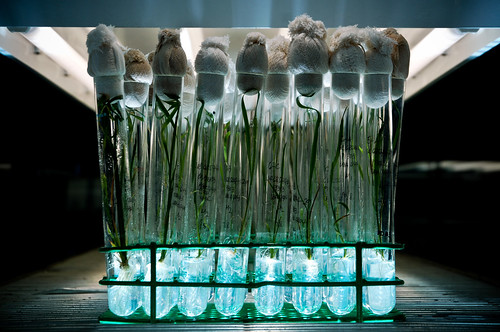 |
| Rice research. Photo by IRRI images on Flickr |
Cutting-edge science is revealing layer
upon layer of adaptive mechanisms within the cell which can be passed
on to future generations, but which don't alter the genetic code.
Research on lower animals is showing
how the expression of DNA (genes and non-gene sequences) triggers a
cascade of events and feed-back loops in the cell: the cascade not
only alters the RNA messenger molecules and proteins, but comes back
full-circle to re-formulate the DNA's own structure (but not its
base sequence) and the chromosomes which carry it.
At all
these stages, permanent changes can be made resulting in permanent
and heritable alterations to the whole DNA-based machinery. For
example, in one experiment, the deletion of key genes in a species of
worm which led to increased life-span, also led to changes which
continued to impart longevity to future generations even
after the missing genes had been
bred back into the offspring.
Adding
an even bigger layer of complexity to this picture is the influence
of environmental factors: diet,
early development and stress all alter DNA expression, and their
effects can be permanent and heritable.
Most
of the information emerging is from animal studies. However, given
the ubiquitous nature of DNA and the fundamental cell structure
common to all higher organisms, parallel forces are bound to be at
work in plants. An artificial 'diet' of agri-chemicals and a
life-long assault from toxic sprays and monoculture-banqueting pests,
which is the lot of the average crop-plant, will certainly cause
heritable, non-genetic changes in their cells. Add to these the
inevitable permanent effects from the weed-killer accumulating in
herbicide-tolerant GM plants and from the insecticidal 'Bt' protein
generated in insect-resistant plants (see WHAT GLYPHOSATE DOES TO PLANTS - GMFS News Archive, December 2010, Bt IS TOXIC TO PLANTS
- July 2011)
Plants developed through modern 'breeding' technologies have all been
subject to DNA-damaging treatments: chemicals or radiation
(mutagenesis), bombardment with DNA-coated metal particles (genetic
transformation and Rapid Trait Development Systems*), infection with
pathogenic bacteria (genetic transformation), and tissue culture in
which the cells are grown in growth-promoting media unconnected with
any whole-plant or natural environment. Changes in DNA, RNA and
proteins during these procedures are well known to occur. It is
accepted, for example, that unexpected physical and physiological
characteristics are an inevitable outcome. One study showed clearly
that genes associated with stress remained changed for several
generations after radiation and Agrobacterium-mediated genetic
transformation (see STRESSED PLANTS, STRESSED PEOPLE - GMFS News Archive, June
2010). The inescapable conclusion is that our food is chronically
stressed, and GM food particularly so.
OUR COMMENT
Modern, damaging, breeding technologies have proceeded for years on
the assumption that by repeatedly 'back-crossing' the damaged
individual with undamaged relatives, the unwanted changes will be
diluted and will finally disappear. There's also been a reliance on
the assumption that, during sexual reproduction, DNA alterations
arising during the parents' lives are re-programmed back to a
base-line state.
It's
now clear that back-crossing might never
remove
all the damage from the human manipulations. It's also obvious that
only certain aspects of DNA function are reset during sexual
reproduction of the plants.
Whereas
mutagenesis and Rapid Trait Development System* cause small changes
in existing genes which might
eventually repair themselves if the plants are reared in healthy
conditions, the wholesale import or removal of DNA in genetic
transformation imposes a permanent stress which all the scientific
evidence suggests can't be healed.
There's no doubt that, if we want to be healthy we have to eat
healthy food, and if we want healthy food we have to stop wrecking
its DNA.
*Check out SMART BREEDING TOOL - August 2012
SOURCES:
- Dr. Eva Sirinathsinghji, Non-genetic Inheritance of Longevity, Institute of Science in Society Report 8.05.12
- Dr. Mae-Wan Ho, Caring Mothers Reduce Response to Stress for Life, Science in Society Report, 7.09.04
No comments:
Post a Comment
Thanks for your comment. All comments are moderated before they are published.